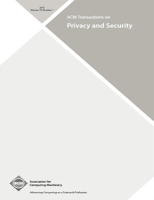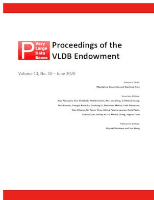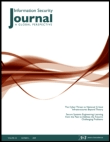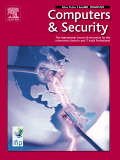
ACM Transactions on Privacy and Security
Scope & Guideline
Advancing Knowledge in Privacy and Risk Management.
Introduction
Aims and Scopes
- Privacy-Preserving Technologies:
Research on methods and frameworks that ensure the privacy of users and data, including cryptographic techniques, secure multi-party computation, and privacy-preserving machine learning. - Cybersecurity Threat Detection and Response:
Studies focused on identifying and mitigating threats in digital environments, including malware detection, intrusion detection systems, and the analysis of adversarial attacks. - Secure Systems and Architectures:
Exploration of secure system designs, architectures, and protocols aimed at enhancing the security posture of various applications, including IoT, cloud computing, and mobile systems. - User-Centric Security and Privacy:
Research that addresses user behavior and perceptions related to security and privacy, aiming to create more user-friendly and effective security solutions. - Data Protection and Compliance:
Investigations into frameworks and methodologies for data protection, compliance with privacy regulations, and the ethical implications of data handling.
Trending and Emerging
- Artificial Intelligence in Security:
A growing number of studies are leveraging AI and machine learning for enhancing security measures, including threat detection, anomaly detection, and predictive analytics. - Adversarial Machine Learning:
Research focusing on adversarial attacks and defenses in machine learning models is on the rise, highlighting the need for robust AI systems in security applications. - Privacy-Preserving Machine Learning:
There is an increasing focus on developing methods for machine learning that protect user privacy, such as federated learning and differential privacy, reflecting heightened awareness of data privacy concerns. - Zero-Trust Security Models:
Emerging architectures, particularly in IoT and cloud environments, emphasize zero-trust models that assume no implicit trust in any entity, driving innovative security frameworks. - Blockchain and Decentralized Solutions:
Research into blockchain technology and decentralized solutions for enhancing security and privacy is gaining momentum, particularly for data sharing and transaction verification.
Declining or Waning
- Traditional Authentication Mechanisms:
Research on classical authentication methods, such as password-based systems, appears to be declining as newer, more advanced authentication mechanisms (like biometric and multi-factor authentication) gain traction. - Static Analysis Techniques:
While still relevant, the focus on static analysis techniques for security assessment has diminished as dynamic and adaptive approaches to security analysis become more popular. - Legacy Systems Security:
The exploration of security vulnerabilities in legacy systems is less common, possibly due to a shift towards securing modern architectures and cloud-based environments. - Generalized Malware Detection:
The trend towards highly specialized and adaptive malware detection techniques has overshadowed more generalized approaches, which are becoming less frequently discussed. - Privacy Policies and Compliance Frameworks:
While important, the specific analysis of privacy policies and compliance frameworks is waning, possibly as researchers focus on more technical solutions to privacy challenges.
Similar Journals

Proceedings of the VLDB Endowment
Advancing the frontiers of database innovation.Proceedings of the VLDB Endowment is a prestigious academic journal published by the Association for Computing Machinery, focusing on advanced research in the field of computer science, particularly in areas related to database management, big data, and information systems. With an impressive Impact Factor reflecting its Q1 categorization in the Computer Science (miscellaneous) quartile, the journal ranks #12 out of 133 in its field according to Scopus, placing it in the 91st percentile. The journal serves as a vital platform for disseminating high-quality research findings and fostering innovation in data management technologies. The VLDB Endowment, in operation since 2008, embraces an open-access model, ensuring that valuable insights reach a broad audience, including researchers, professionals, and students who are eager to push the boundaries of knowledge in computer science. With its commitment to excellence, this journal significantly contributes to the ongoing dialogue within the global research community.

Cluster Computing-The Journal of Networks Software Tools and Applications
Connecting Ideas, Driving Applications in ComputingCluster Computing - The Journal of Networks Software Tools and Applications, published by Springer, is a premier academic journal catering to the vibrant fields of computer networks and software technologies. With an impressive impact factor and recognized as a Q1 journal in both Computer Networks and Communications and Software categories for 2023, it ranks within the top echelons of its field, boasting a Scopus rank of #50 out of 395 and #59 out of 407 respectively, highlighting its influence and reach. The journal, which has been in continuous publication since 2005, serves as a vital platform for groundbreaking research, offering insightful articles and tools that drive innovation in network computing. Researchers, professionals, and students are invited to contribute to and benefit from the dynamic discourse presented in this journal, which is pivotal for advancing knowledge and enhancing practical applications in a rapidly evolving technological landscape.

Jordanian Journal of Computers and Information Technology
Catalyzing Academic Excellence in Computing ResearchJordanian Journal of Computers and Information Technology, published by Princess Sumaya University and SRSF, stands as a significant platform for scholarly research in the realm of computer science, particularly in topics related to emerging technologies and information systems. With its Open Access model initiated in 2015, the journal facilitates global access to high-quality research findings, embodying the principles of knowledge sharing and academic collaboration. The journal's ranking in the Q3 category of Computer Science (miscellaneous) and its placement in the 54th percentile of Scopus' General Computer Science rankings underscore its growing reputation among researchers and professionals alike. Situated in Amman, Jordan, the journal actively contributes to the regional and international discourse on computing methodologies, applications, and innovations, making it an indispensable resource for scholars seeking to advance their understanding and engage with contemporary issues in technology.

Information Security Journal
Exploring Innovative Solutions in Cybersecurity.The Information Security Journal, published by Taylor & Francis Inc, is a pioneering platform dedicated to disseminating knowledge in the realms of information security, computer science applications, and information systems management. With an ISSN of 1939-3555 and an E-ISSN of 1939-3547, this journal has successfully carved its niche within the Q2 quartile of the 2023 rankings for both Computer Science Applications and Information Systems and Management, while also being recognized in Q3 for the Software category. Located in the United Kingdom, the journal has been committed to advancing research and fostering innovation from 2008 through 2024, making it an essential resource for academics and professionals alike. With a significant Scopus ranking in its fields—placing 43rd out of 148 in Decision Sciences and 271st out of 817 in Computer Science Applications—the journal stands as a vital source of interdisciplinary insights. Although it does not currently offer open access options, the quality of publications and the journal's dedication to the field ensure that it remains a compelling choice for researchers seeking to publish their findings or stay abreast of current developments in information security.

COMPUTERS & SECURITY
Leading the charge in cutting-edge cybersecurity research.COMPUTERS & SECURITY is a leading international journal published by Elsevier Advanced Technology, dedicated to advancing the interdisciplinary field of cybersecurity. With an impact factor reflecting its prestige, this journal holds a remarkable Q1 ranking in both Computer Science and Law categories according to the 2023 rankings. Since its inception in 1982, it has provided a platform for high-quality research that addresses key challenges in computer security, cyber law, and technology policy, and aims to evolve as the digital landscape continues to transform. Researchers and professionals seeking to contribute to vital discussions about security vulnerabilities, threat mitigation, and legal frameworks will find this journal an invaluable resource. Although it is not open access, the journal maintains a robust presence in the scholarly community, with exceptional rankings in Scopus—#7 in Social Sciences (Law) and #18 in General Computer Science, both highlighting its critical role in shaping knowledge and practice in these fields.

Cryptography, an esteemed journal published by MDPI, focuses on the rapidly evolving fields of cryptography and information security, providing a platform for researchers and practitioners to share their findings and advancements. Since its inception in 2017, it has embraced an Open Access model, allowing unrestricted access to high-quality research articles, thereby fostering collaboration and innovation among academics globally. Based in Switzerland, this journal aims to cover a broad spectrum, from theoretical foundations to practical applications, contributing significantly to fields such as Applied Mathematics and Computer Science. Its impressive rankings in reputable databases like Scopus reflect its relevance and quality, holding a Q2 category in multiple disciplines, including Computational Theory and Mathematics and Computer Networks and Communications. With the continuous rise in importance of cybersecurity and data protection, Cryptography serves as a vital resource for professionals, students, and researchers dedicated to advancing knowledge in these critical areas.

Journal of Information Assurance and Security
Innovating Solutions for a Safer Digital Realm.Journal of Information Assurance and Security, an esteemed publication by DYNAMIC PUBLISHERS, INC, serves as a pivotal platform for the dissemination of innovative research and insights in the field of information security and assurance. With its ISSN 1554-1010 and E-ISSN 1554-1029, this journal addresses critical vulnerabilities, emerging technologies, and methodologies that fortify data integrity and uphold privacy in our increasingly digital world. Although specific metrics such as the HIndex and Scopus ranks are currently unavailable, the journal is recognized for its contributions to both academia and industry, fostering collaboration among researchers, professionals, and students dedicated to advancing security protocols. The journal does not currently offer open access but ensures comprehensive accessibility through institutional subscriptions. As cybersecurity continues to be a paramount concern globally, the Journal of Information Assurance and Security stands out as an essential resource for groundbreaking studies and practical applications that drive the future of information protection.

JOURNAL OF SUPERCOMPUTING
Unraveling the Complexities of Theoretical Computer ScienceJOURNAL OF SUPERCOMPUTING is a premier academic journal published by SPRINGER, situated in the Netherlands, that has made significant contributions to the fields of computer science, particularly in hardware and architecture, information systems, software, and theoretical computer science. With a robust publication history spanning from 1987 to 2024, this journal has cultivated a strong reputation, evidenced by its Category Quartiles ranking in the Q2 category across multiple relevant domains in 2023. The journal's Scopus rankings further underscore its influence, boasting a 78th percentile in mathematics and theoretical computer science, revealing the high quality of research disseminated within its pages. As vital discourse unfolds in the realm of supercomputing—where innovative techniques and technologies rapidly evolve—this journal serves as a crucial platform for researchers, professionals, and students to explore cutting-edge studies and build upon the foundations of knowledge in this dynamic field.

Journal of Cloud Computing-Advances Systems and Applications
Transforming Insights into Impactful SolutionsThe Journal of Cloud Computing - Advances Systems and Applications, published by Springer, serves as a premier platform for disseminating cutting-edge research in the fields of cloud computing, computer networks, and software technologies. With an impressive impact factor and ranked in the top quartile for Computer Networks and Communications and Software categories in 2023, this open access journal has gained significant recognition within the academic community since its establishment in 2012. The journal not only provides valuable insights into innovative applications and advancements in cloud technologies but also supports collaboration among scholars, practitioners, and industry leaders. Operating from the vibrant hub of New York City, it boasts a robust international readership, ensuring that the latest findings reach a diverse audience. Authors and researchers are encouraged to engage with this vital resource, which is dedicated to exploring the transformative potential of cloud computing across multiple disciplines.

Journal of Computer Security
Driving the evolution of safety and reliability in technology.Welcome to the Journal of Computer Security, a premier publication dedicated to advancing the field of cybersecurity and digital safety. Published by IOS PRESS, this esteemed journal has been at the forefront of research since its inception, with a rich history spanning from 1992 to 2024. Based in the Netherlands, the journal aims to provide a reputable platform for researchers and professionals to disseminate innovative findings in various subfields, including computer networks, hardware architecture, and software engineering. With its current Q3 ranking across multiple categories and a focus on safety, risk, reliability, and quality, the journal plays a critical role in shaping contemporary discourse and fostering collaboration within the cybersecurity community. Though it is not an open-access journal, the Journal of Computer Security remains a vital resource for academics and practitioners alike, offering access to significant advancements and methodologies that guide the evolution of security practices worldwide. Engage with us and contribute to this dynamic field of study!